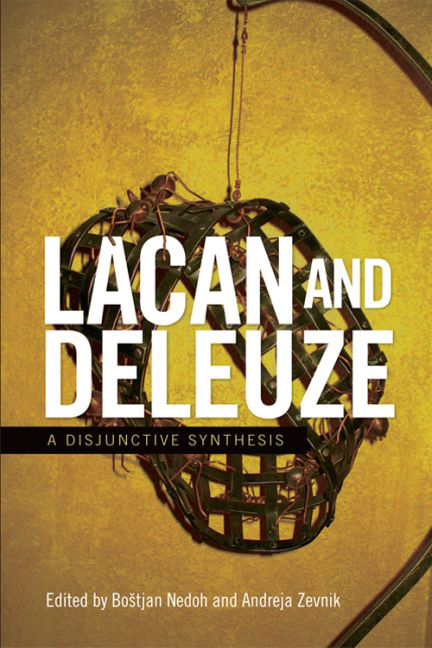Book contents
- Frontmatter
- Contents
- Acknowledgements
- Introduction: On a Disjunctive Synthesis between Lacan and Deleuze
- 1 For Another Lacan-Deleuze Encounter
- 2 Reciprocal Portrait of Jacques Lacan in Gilles Deleuze
- 3 Does the Body without Organs Have Any Sex at All? Lacan and Deleuze on Perversion and Sexual Difference
- 4 Gnomonology: Deleuze's Phobias and the Line of Flight between Speech and the Body
- 5 Lacan, Deleuze and the Politics of the Face
- 6 Denkwunderkeiten: On Deleuze, Schreber and Freud
- 7 Snark, Jabberwock, Poord'jeli: Deleuze and the Lacanian School on the Names-of-the-Father
- 8 Baroque Structuralism: Deleuze, Lacan and the Critique of Linguistics
- 9 Exalted Obscenity and the Lawyer of God: Lacan, Deleuze and the Baroque
- 10 The Death Drive
- 11 Repetition and Difference: Žižek, Deleuze and Lacanian Drives
- 12 Lacan, Deleuze and the Consequences of Formalism
- Notes on Contributors
- Index
12 - Lacan, Deleuze and the Consequences of Formalism
Published online by Cambridge University Press: 20 April 2017
- Frontmatter
- Contents
- Acknowledgements
- Introduction: On a Disjunctive Synthesis between Lacan and Deleuze
- 1 For Another Lacan-Deleuze Encounter
- 2 Reciprocal Portrait of Jacques Lacan in Gilles Deleuze
- 3 Does the Body without Organs Have Any Sex at All? Lacan and Deleuze on Perversion and Sexual Difference
- 4 Gnomonology: Deleuze's Phobias and the Line of Flight between Speech and the Body
- 5 Lacan, Deleuze and the Politics of the Face
- 6 Denkwunderkeiten: On Deleuze, Schreber and Freud
- 7 Snark, Jabberwock, Poord'jeli: Deleuze and the Lacanian School on the Names-of-the-Father
- 8 Baroque Structuralism: Deleuze, Lacan and the Critique of Linguistics
- 9 Exalted Obscenity and the Lawyer of God: Lacan, Deleuze and the Baroque
- 10 The Death Drive
- 11 Repetition and Difference: Žižek, Deleuze and Lacanian Drives
- 12 Lacan, Deleuze and the Consequences of Formalism
- Notes on Contributors
- Index
Summary
There is a particular use of formalism in Deleuze and Lacan, essentially counterpoised to the thought of the signifier's adequate sense, but nevertheless decisive, for both, in witnessing its possible passage to a truth. This use of formalism is, as I shall argue, continuous both with twentiethcentury developments of the attempt to found mathematics on a purely logical writing and with the original sense of ‘form’ (eidos) as the thinkable unity of ‘one over many’, with which Plato sought to capture the possible contact of thought with what is real in itself. It is to be distinguished, on the other hand, from any exterior translation of natural language into formal symbolism or, conversely, the simple ‘application’ of fixed formalsymbolic calculi to an already constituted field. It is also not simply a matter of ‘structuralism’. For before the ‘structuralist’ reference to natural languages as systems of arbitrarily or conventionally posited differences lie, as its conditions of possibility and the grounds of its coherence, the problems to which formalism answers for both Deleuze and Lacan: those (for instance) of the totality of possible signification, the structure and genesis of the possible sense of signs, and the topological position from which these conditions can themselves be assayed. Thus rather than a simple regimentation or application of formal systems of signification, the use of formalism in Deleuze and Lacan involves finding the possible passage of signification to its specific limit: the place where, formalising the limits of its own mimetic or representational capacities, formalism itself marks, at its own impasse, a new possible inscription of truth. At this place, as I shall argue, it also witnesses the constitution of linguistic sense, the first entry of something like a ‘one’ into a world of otherwise pure multiplicity, and thereby the point, beyond possible representation, of thought's possible contact with being in itself.
In the following, I present this use of formalism, as it is developed most centrally in Lacan's Seminars XVII, XIX and XX, and in Deleuze's works of roughly the same period, especially his 1968 doctoral thesis, Difference and Repetition, and the closely related 1969 The Logic of Sense. This is not to prejudice, or presumptively exclude, the different or differently articulated positions that both thinkers would take with respect to formalism before or after the period I consider here.
- Type
- Chapter
- Information
- Lacan and DeleuzeA Disjunctive Synthesis, pp. 203 - 220Publisher: Edinburgh University PressPrint publication year: 2017



